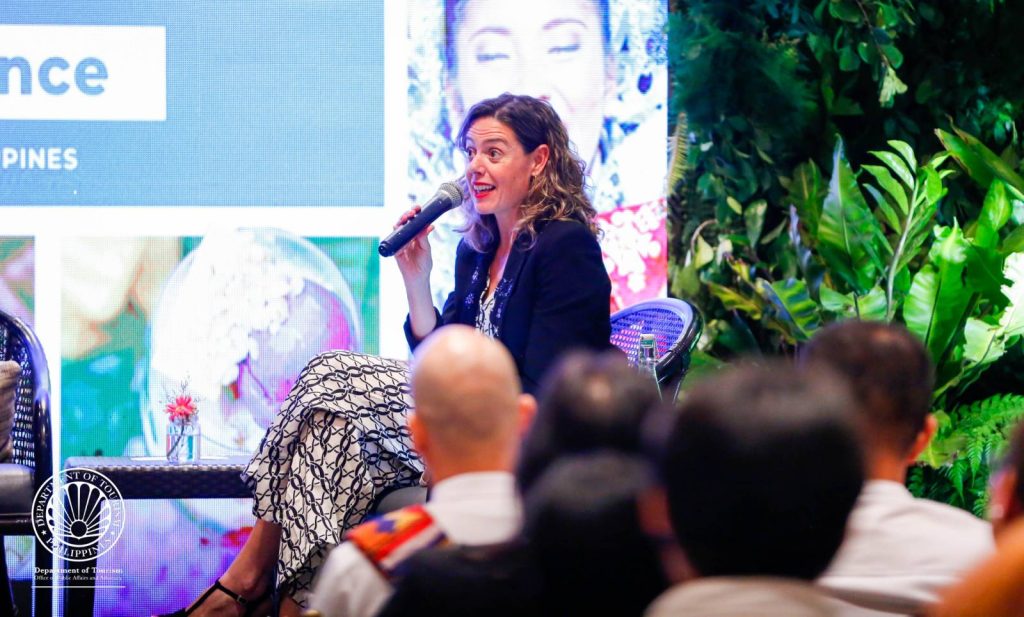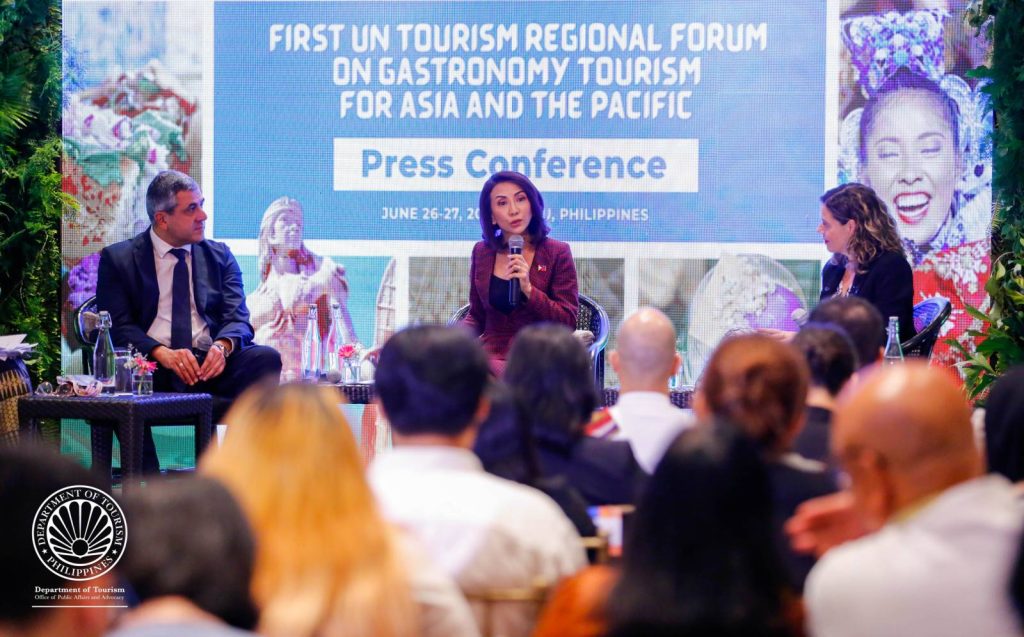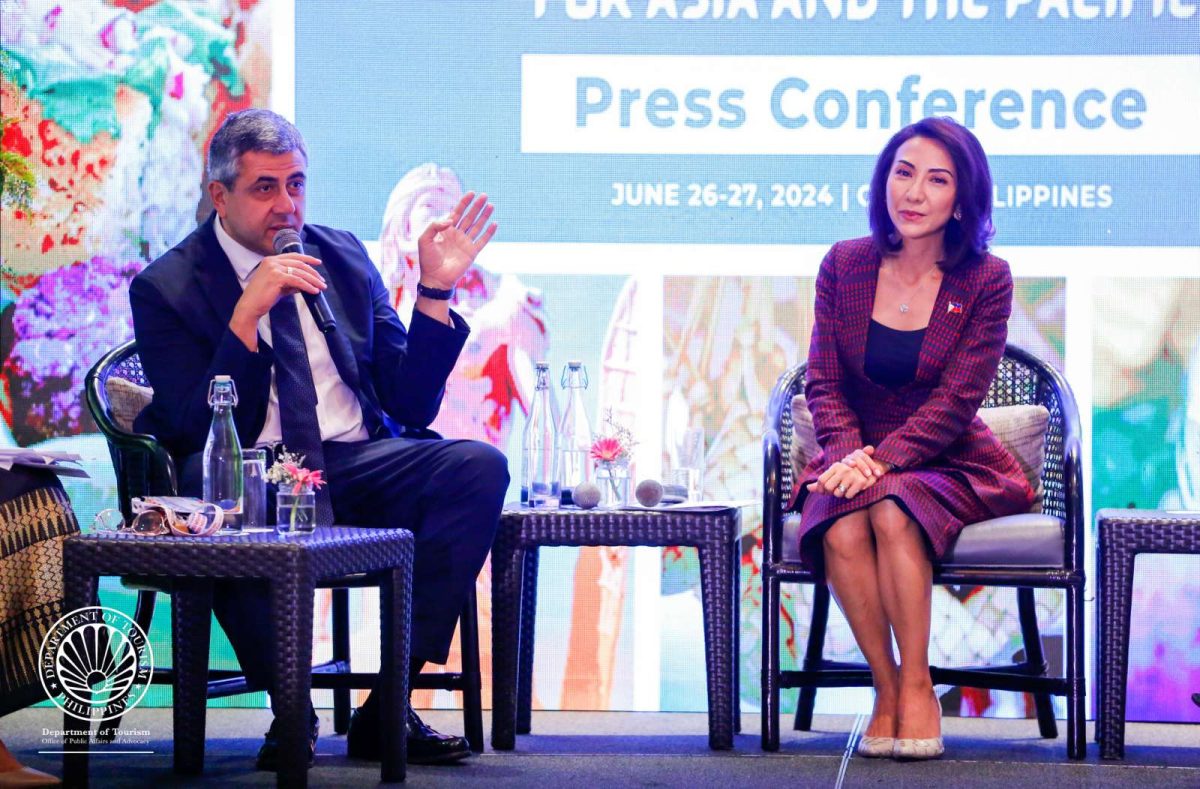MEDIA RELEASE
29 June 2024
CONTACT:
CZARINA ZARA-LOYOLA
Director
Office of Public Affairs and Advocacy
czloyola@tourism.gov.ph
CEBU – The Philippines has emerged as an “impressive” host for the United Nations (UN) Tourism Regional Forum on Gastronomy Tourism for Asia and the Pacific.
The event has garnered positive remarks from participants and international partners for its remarkable success in promoting Filipino cuisine and culture and showcasing the rich gastronomic heritage of the country.
The event, held in Cebu, Philippines on Wednesday (June 26, 2024) received appreciation from Idoia Calleja, Director of Masters and Courses of the Basque Culinary Center (BCC), “a unique ecosystem where training, innovation, research and entrepreneurship coexist with the aim of developing and promoting gastronomy”.

The BCC creates guidelines on how to develop gastronomy destinations. Located in Donostia – San Sebastian since 2011, it is a pioneering institution made up of the Faculty of Gastronomic Science and BCC Innovation, the Gastronomy Technological Centre.
In a press briefing, Calleja expressed being highly impressed with The Philippines’ hosting of the forum which served as a platform for exchanging ideas, sharing best practices, and promoting gastronomy tourism in the Asia Pacific Region.
“First of all, thank you. I love the performances. This is like a pilot for a two-phase for us. I am very, very impressed. As I was saying, this, mentioned before, is a way to exchange ideas, see best practices, and continue generating strong gastronomy tourism. We have the guidelines that go more concretely to the strategy. And also we are developing another initiative in our use cases to empower gastronomy tourism. So we have the steps and we are developing more and more steps,” said Calleja.

Meanwhile, in the same press conference, Secretary-General of UN Tourism Zurab Pololikashvili shared the challenges faced in organizing worldwide gastronomy forums, of which he also shared the rationale behind the decision to hold the regional forum in the Philippines. He lauded Department of Tourism (DOT) Secretary Christina Garcia Frasco for successfully motivating the UN Tourism Commission to choose the Philippines as the venue for the regional forum.
“We had numerous countries asking to host this Gastronomy Forum. Also, it was very difficult to bring participants from Asia to the Americas. Additionally, we saw a demand for this kind of event and decided to create regional ones. This one is the first. Now, we are organizing across five continents. Why Cebu? Because you have a very active Minister here. It’s clear; we have 160 countries. If you ask why we didn’t do it in Japan, it’s because we did one in Nara two years ago. The Secretary was very patient and knew it was important for her country and the region. She was the perfect candidate. She made an excellent presentation explaining why we should have it here and convinced and motivated us to come. Am I right or not? We had a chance to have dinner in Cambodia, where we enjoyed an excellent Filipino dinner. This is how it works; if other countries want to host the second edition, we are here, and of course, there are criteria. First, there must be a suitable venue and a prepared team. Then, gastronomy must be a priority for the destination country. That’s it. This is how we select the locations for these events,” said Pololikashvili.
“I think we all need to promote Filipino cuisine more. What I saw this afternoon, I’ve never seen Filipino cuisine showcased like this before. I see many opportunities to promote culinary tourism in the Philippines because the best ambassadors are in restaurants and chefs. This is what we’ve seen, and we’ve had many good showcases. We can talk about how gastronomy has made countries attractive and how it has made popular destinations and local dishes different. Thank you, Secretary, and all of you who are working hard to promote your beautiful country. I love Cebu and I love the Philippines,” enthused Pololikashvili.
In a separate message during the opening ceremony, Pololikashvili also broached the possibility of establishing an educational center for gastronomy in the country: “I propose to leave a legacy after these nice days is to create something of an educational center or gastronomy center here in Cebu. After all, education is our top priority.”
To this, Tourism Secretary Frasco responded during the press conference: “If I may Secretary General, allow me now in public to confirm the Philippines’ acceptance of the Tourism Gastronomy Education Academy or Institute. We are certainly very open to any discussions, whether it be funding, curriculum, and the like. We have the support of the national government and importantly as well we have the support of those that will help us in the flourishing of this academy partnership”.
Cebu as forum host
The highlight of the event was the promotion of Filipino cuisine representing all regions of the country.
Secretary-General Pololikashvili expressed his awe at the diversity and uniqueness of Filipino cuisine, stating that he had never seen it presented in such a way anywhere else in the world. He emphasized the niche that Filipino food possesses, with its wide range of flavors, spices, and diversity.
Meanwhile, Secretary Frasco highlighted the half a millennium of history that Cebu holds. She emphasized that Cebu, as the place where the first vestiges of Filipino hospitality, kindness, and food were experienced by foreigners through explorer Ferdinand Magellan in 1521, is the perfect choice for hosting the forum.
“The efforts of our President, Ferdinand Bongbong Marcos, Jr., have been to put the global spotlight on Filipino food, as we feel that it is high time to honor the work and talent of our chefs, as well as all our partners in the tourism value chain, making Filipino food truly an exciting argument to be made as the next best thing in gastronomy tourism. I’m thrilled that United Nations Tourism, through the gracious and visionary leadership of its Secretary-General Zurab Pololikashvili, has honored our country with this opportunity. And what better place to hold it than in Cebu, where the very first vestiges of Filipino hospitality and kindness were experienced by foreigners through the explorer Ferdinand Magellan in 1521. After a long and arduous journey to circumnavigate the world, Magellan was treated to Filipino food in the form of fish, bananas, and palm wine, and a feast of meats which is well-documented in Pigafetta’s book,” said Frasco.
“Cebu has become a gateway for tourism in the Philippines, especially with the Mactan Cebu International Airport previously awarded Asia’s best airport in the under 5 million category and it serves as a MICE destination with a host of convention centers. Most importantly, Cebu is the cradle of Christianity, reflecting our diverse Filipino heritage shaped by generations of Spanish, Chinese, American, and other influences. We view this as a wonderful opportunity to advance our President’s vision for highlighting Philippine gastronomy tourism and collaborating with our fellow member nations in UN Tourism to work towards the full development of gastronomy tourism for the Asia Pacific region, ensuring it is inclusive and sustainable,” concluded the tourism chief.

